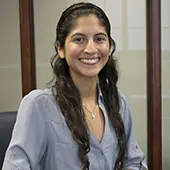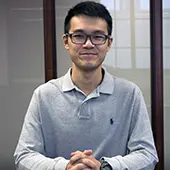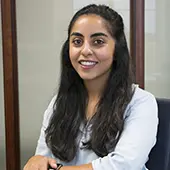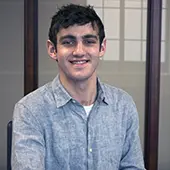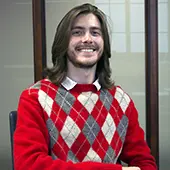2018-2019 Cluster Fellows
Melissa Barona
Department/Program: Chemical and Biological Engineering
Faculty Advisors: Randall Q. Snurr, Chair of Chemical and Biological Engineering, John G. Searle Professor of Chemical and Biological Engineering
Status of Studies: Fifth Year
What is your area of focus at Northwestern?
As a PhD student in the Chemical and Biological engineering department, the goals of my current research are to accelerate catalyst discovery for natural gas conversion to liquid fuels. The selective oxidation of light alkanes to alcohols is a fundamental reaction for converting natural gas and storing its energy in liquid fuels that can be more easily transported. The tunability of metal organic frameworks (MOFs) give us the opportunity to develop structure/activity relationships and gain insight into how to improve their catalytic performance for these reactions. Using computational tools, we aim to identify reactivity descriptors that can help us screen and predict the activity of MOF-supported catalysts for natural gas conversion.
Why were/are you interested in a fellowship?
I was interested in the Cluster Fellowship for the opportunity to take and serve as a teaching assistant (TA) in courses that would give me a broad overview of sustainability. I am also very excited to engage with a variety of energy and sustainability industry leaders, as well as other graduate students that are also passionate about this field. The opportunity that the Trienens Institute provides to interact with students, faculty, and industry leaders in the field of sustainability will be very valuable for achieving my career goals of working to develop more sustainable solutions to our world energy problems.
What are your plans/hopes for the future?
My personal experience growing up in a developing country and subsequent education in sustainability that led to my bachelor’s degree in environmental engineering and now my PhD candidacy in chemical and biological engineering give me a great sense of environmental responsibility and inspire me to be a leader in the field of sustainability. My ultimate professional plan is to work within a company or organization that works to improve the living standards of developing countries through sustainable methods.
What is life like as a Cluster Fellow?
As a Cluster Fellow I am learning the different ways that we affect our environment through our energy and water usage in the classes that I take and that I TA. I have also genuinely enjoyed interacting with faculty and other graduate students that are just as passionate as me about the field. The interdisciplinary nature of the fellowship allows me to learn about others' perspectives on energy and sustainability, including those with backgrounds in engineering, geology, earth science, and business, among others.
Joseph Ni
Department/Program: Chemical and Biological Engineering
Faculty Advisor: Linda Broadbelt, Sarah Rebecca Roland Professor of Chemical and Biological Engineering, Associate Dean for Research; Keith E.J. Tyo, Associate Professor of Chemical and Biological EngineeringStatus of Studies: Second Year
What is your area of focus at Northwestern?
Microorganisms can be engineered into microbial factories that harness energy and materials from renewable waste biomass, and convert them into valuable chemical compounds. I am developing computational tools to find the optimal enzymatic reactions that lead to these compounds. This is achieved by realistically predicting and fine-tuning enzyme promiscuity, so that chemicals of interest can be produced beyond current knowledge of biology.
Why were/are you interested in a fellowship?
I am motivated by the possibility that chemicals can be sustainably produced in biological systems. Through participating in Trienens Institute activities and outreach, I want to learn more from a larger community of environmentally-minded researchers on how my work can be applied and make an impact.
What are your plans/hopes for your future?
I hope to work in the biotechnology industry, and provide biological solutions to improve the life cycle of existing chemical products. By opening up vast possibilities for the biosynthesis of chemicals, I hope to replace the need for many traditional chemical processes with renewable biological alternatives.
What is most exciting about your life as a student and fellow?
The Trienens Institute brings together a community of students, researchers, and faculties who are deeply interested in solving the most pressing issues related to energy and sustainability. By participating as a fellow, I have the opportunity to learn from their diverse experiences, and together tackle these issues with our combined interdisciplinary efforts.
Niloufar Sarvian
Department/Program: Earth and Planetary Sciences
Faculty Advisor: Matthew Hurtgen, Professor, Department Chair; Andrew Jacobson, Professor, Director of the Environmental Sciences Program Status of Studies: Second Year
What is your area of focus at Northwestern?
My research focuses on the carbon cycle and the mechanisms that affect climate. Using a novel geochemical technique, I aim to study the causal mechanisms that led to the Neoproterozoic Snowball Earth.
Why were/are you interested in a fellowship?
Sustainability and climate change have long been an interest of mine, and I feel strongly about applying my skillset to understand the world’s climate change and sustainability problems. The interdisciplinary nature of the Trienens Institute also appeals to me because it allows me to interact with others outside of my immediate area of focus to find different ways to address our world’s problems.
What are your plans/hopes for your future?
In the future I hope to utilize my PhD to continue doing research in an academic context, and to share my passion for sustainability with others.
What do you find most inspiring/encouraging about your life as a student and fellow?
Being a fellow is a great opportunity to share my passions with undergrads as a TA for Trienens Institute courses. Furthermore, I get to participate in professional development opportunities that will expand my interactions with the renewable energy sector and help build my understanding of potential applications of my research to industry.
Travis Schmauss
Department/Program: Materials Science and Engineering
Faculty Advisor: Scott Barnett, Professor of Materials Science and Engineering
Status of Studies: Third Year
What is your area of focus at Northwestern?
I work with electrochemical energy conversion and storage, through solid oxide fuel and electrolysis cells. In my lab, under principal investigator Scott Barnett, we’re bridging the gap between performance at the 0-hour mark of a cell’s lifetime, and that at the 40,000-hour mark, by focusing on inhibiting degradation mechanisms like microstructural coarsening or surface cation diffusion that develop perniciously over time. These devices, if made to be long-lasting, can offer an economic means to convert excess renewable power to a high energy density fuel, and back again in periods of excess demand, on timelines more akin to seasonal depressions and abundances in energy generation/demand than the typical duck-curve seen in twenty-four hours.
Why were/are you interested in a fellowship?
The Trienens Institute has allowed me to contextualize the hard science research I do into the broader, and rapidly terraforming, energy landscape. While scientific lab work is fun for me in its own right, science as custodial service to our humanity’s welfare is a more transcendental motivating factor. The Trienens Institute, through its events and classes, brings together people and ideas from across this university and outside of it, exposing me to the whole team of players. This fellowship, which I am so thankful to have received, enriches my involvement in the energy community and helps prepare me for a lifetime working in energy, beyond the graduate student lab bench.
What are your plans/hopes for your future?
The idea of running parallel to academia at a funding agency is very appealing to me, as I want a career that not only requires honed, PhD-level experience with how science happens, but also one that requires an augmented understanding of what technological progress and which milestones are best suited, and when, in order to hasten our adoption of sustainable energy. Such a place to end up will require a diversity of experiences with energy technology, so out of my PhD I’m focusing on walking through whichever becomes the best open door for me when it arrives, which could be anything from post-doctoral research to start-ups, or established private sector industry.
What do you find most inspiring/encouraging about your life as a student and fellow?
Every year sees a new cohort of students joining our department, and it seems like energy research is getting all the more popular, with more students wanting to focus on it academically and as the subject of their graduate school research. I really get encouraged when I see my excitement reflected in prospective students thinking of joining an energy-focused lab when I share my own experiences in one. Similarly, mentorship of Northwestern undergraduate researchers and those I TA, and even of local high school students through the Mentorship Opportunities for Research Engagement program, allows for this mutual feeling of encouragement and assuredness that comes from others, particularly those younger than yourself, sharing in your passion.
Samuel Wallace
Department/Program: Civil and Environmental Engineering
Faculty Advisor: Jean-Francois Gaillard, Professor of Civil and Environmental Engineering and (by courtesy) Earth and Planetary SciencesStatus of Studies: Second Year
What is your area of focus at Northwestern? I am an environmental engineer focused on issues surrounding our metal resources. The growing importance of information technology, energy storage, and renewable energy generation are placing new demands on a range of metals, like cobalt, indium, and rare earth elements. These metals are critical for the development of a sustainable industrialized economy, but care must be taken to secure these resources without damaging the environment, global health, or access to these metals going forward. My research interests are preventing contamination of water resources by metals and acquiring metals through unconventional means.
Why were/are you interested in a fellowship?
Collaboration across disciplines is essential in tackling the issues facing the environment and our resources. As such, the Trienens Institute's commitment to engaging with people from diverse interests, backgrounds, and experiences marks an important step in developing and implementing sustainable practices and policies. I am looking forward to pursuing this goal as a part of the Trienens Institute community.
What are your plans/hopes for your future?
I hope to use my experience as part of a future career researching and communicating issues of environmental significance, especially climate change and resource preservation.
What is most exciting about your life as a student and fellow?
The opportunity to conduct research seeking solutions to the major challenges facing our society is incredibly validating, and being a part of a community with similar interests and goals offers a reason for optimism moving forward.
